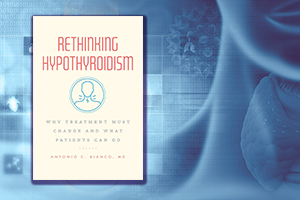



| By Dr. Ronald Hoffman

“Fake news.” It’s now firmly in the lexicon of most Americans. But it doesn’t just apply to politics—it’s also rampant in health reporting.
Earlier this year, I wrote an article entitled “Why most health news is fake news”. In that story, I cited the work of academic gadfly John Ioannidis, who famously authored a paper entitled “Why Most Published Research Articles Are False”.
This year Ioannidis wrote another call to action to suppress fake news—this time about nutrition: “The Challenge of Reforming Nutritional Epidemiologic Research”. Bottom line: he demonstrates that scientists can mangle statistics to demonstrate that virtually anything can kill you!
Picking up on last week’s newsletter, here are five additional fake health news stories that deserve ignominy in 2018:
6. Don’t believe the hype, organic food doesn’t prevent cancer: So trumpets the Guardian. The story is pushback against a new study that demonstrates that consumption of an organic foods diet lowers the rate of cancer, in particular non-Hodgkins lymphoma.
The Guardian article condescendingly intones: “One of the most enduring health fads of the last decades has been the organic movement.” But is it merely a “fad”? I took up the evidence in my article “Are organic foods worth the added expense?”
Increasingly, studies are highlighting the health hazards of pesticides and herbicides that saturate conventional produce. The issue has come to a head with incontrovertible evidence that glyphosate—the weed-killer that “Round-Up Ready” GMO crops have been engineered to resist—is a human carcinogen. Short of causing cancer, these chemicals can cause neurological and reproductive harms, and may damage the human microbiome.
Additional studies suggest that organic fruits and vegetables may have higher concentrations of vitamins, minerals and phytonutrients. Moreover, organic farming is more sustainable, causing less environmental harm.
A little digging reveals that many of the academic defenders of conventional agricultural practices have overt or concealed conflicted relationships with agribusiness, via research grants or direct subsidies.
7. Supplements are worthless and dangerous: The campaign to impugn the supplement industry continued unabated in 2018. Consumer Reports—who never met a vitamin they liked—posted a lurid video with this caption:
“More than 54,000 dietary supplements are on the market. But only about a third have any scientific evidence to back them up and some are linked to serious health risks. Consumer Reports has identified supplements you should avoid.”
But as I point out in an extended rebuttal there’s plenty of substantiation for the benefits of supplements, and critics like Consumer Reports cherry-pick instances of little-used products that have long been recognized by responsible natural health practitioners as worthless or harmful.
8. Taxing red meat would save many lives, research shows: So exults the Guardian, which just gave a pass to pesticide and herbicide-laden produce, but wants to expand government social engineering via prohibitive taxes on meat—110% on processed meat, and 20% on unprocessed beef, pork and lamb.
The result is predicted to be a $170 billion annual tax windfall, said to be enough to bail out the foundering health care systems of advanced countries, while discouraging meat consumption.
The trouble is, health care costs in the U.S. alone are $3.5 trillion per year! And shaky assumptions abound in this Oxford University study—which offers me consolation that I never notched a Rhodes Scholarship to attend the tony British institution.
Will higher taxes really dissuade affluent Westerners from eating meat, or will they simply turn to less healthy, cheaper, carbohydrate-laden ultra-processed foods?
And does the sketchy science linking meat to cancer and heart disease really withstand scrutiny? Many studies are now exonerating meat—particularly organic grass-fed varieties—especially when consumed in the context of a balanced diet rich in healthy produce, unprocessed whole grains and legumes.
9. Saturated animal fat more likely to cause liver damage, heart disease and diabetes than sugar: More meat-bashing from a highly-biased study (The headline is courtesy of the Physicians Committee for Responsible Medicine—a militantly pro-vegan doctors’ group allied with PETA).
In a rebuttal, I explain that the study in question is another example of “If you ask the wrong question, you’ll get the wrong answer,” a familiar theme lately in nutrition research.
Participants were force-fed 1000 extra calories per day, and the high-fat group still got a whopping percentage of their load from carbs! If you’re trying to isolate the harmful effects of fat, don’t feed bacon cheeseburgers to subjects while encouraging them to quaff French fries and chocolate malteds! Of course their livers suffered in this Supersize Me experiment.
Other studies have shown the opposite: A beneficial effect on fatty liver disease of very low carb diets, even when consumed with a moderately high caloric contribution from saturated fats, i.e modified keto.
10. Worshipping the false idols of wellness: Finally, no article this year more epitomizes the sheer ignorance of the critics of natural medicine than this op-ed from the New York Times.
In my withering critique I wrote:
“Bottom-line, Dr. Gunter is a tourist in the exotic land of integrative medicine. Or worse yet, she hasn’t even bothered to book the trip; it’s as if she’s stayed home and casually browsed an Instagram page to form an opinion without so much as setting foot in a foreign destination.”
An excellent companion piece to my “Worst Health News Stories of 2018” article comes to us from healthnewsreview.org. In “Year-ender 2018: Here’s how we can clean up the polluted stream of health care news” they write: “[Our] hope is that more readers, inspired and educated by our example, will demand a higher level of quality from their news sources.”
Now that we’ve sounded the alert for fake health news, be on the lookout for misleading click-bait headlines and stories and send your suggestions to radioprogram@aol.com. We’ll broadcast some of the winning entries on subsequent editions of the Intelligent Medicine podcast—stay tuned!
Though we think of declining estrogen as the hallmark of menopause, it's actually common for…

Up to 12 percent of Americans have ulcers at some point in life. Peptic ulcers…
Gallbladder disease is a modern illness. An estimated 20 million Americans have gallbladder disease. The…

Dr. Antonio Bianco, recipient of the American Thyroid Association’s John B. Stanbury Thyroid Pathophysiology Medal,…

There’s a misconception among low-carb dieters. Many people believe a low-carb diet is much higher…

New, more powerful weight loss drugs: Drugs like Wegovy, Rybelsus, Ozempic and Mounjaro/Zepbound are revolutionizing…

Q&A with Leyla, Part 1: ‘Good’ Bacteria

Our virtual voicemail is open 24/7, so there's no need to wait to submit your questions for Dr. Hoffman. Leave a message, and you may hear your question featured on the Intelligent Medicine radio program!